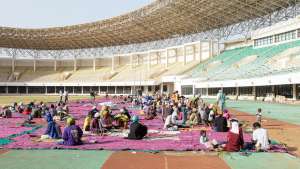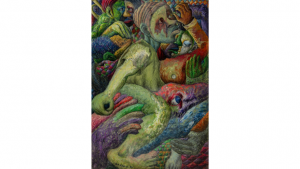Ghanaian Afrofutrist Jonathan Dotse is a techno-progressive who explores the relationship between African electronics, African people, reality and fiction. On his blog afrocyberpunk, Dotse explores possible African futures where technological developments have accelerated economic growth and politics, media and science have all mutated accordingly.
Dotse is currently working on the manuscript of his debut science-fiction novel, “a cyperpunk thriller is set in the sprawling metropolis of Accra" in the near future. Alongside this, Dotse recently founded NubianVR, a virtual reality studio based in Accra, Ghana. NubianVR was cofounded with photographer and film-maker Kabiru Seidu.
The short film Pandora is NubianVR’s first 360-degree film. It debuted at the Chale Wote Street Arts Festival, organised by Accra [dot] Alt, in August 2015 and will be screened at the Goethe Institute's African Futures exhibition in Johannesburg this October.
“Working with virtual reality has been one of my lifelong dreams which is finally metamorphosing into reality,” writes Dotse on afrocyberpunk. “I’ve been designing VR headsets since I was a kid, but I only started building real (as in working) models in November last year when I first discovered the joys of Google Cardboard.”
In a retelling of the Greek myth with the same name, where Pandora is the first woman created by the gods, NubianVR’s film follows Pandora as she moves through a strange, dream-like virtual version of Accra.
In conversation with the organisers of the Chale Wote, Dotse remarked that Pandora was created to discover the possibilities of virtual reality technology in an African context, saying:
“In a very literal sense, our project is meant to exhibit a prototype African electronic device, and to share our love of technological innovation with other African youth. This project aims to promote Ghana as a place where technology is not only consumed but also produced.”







